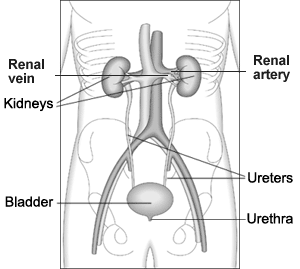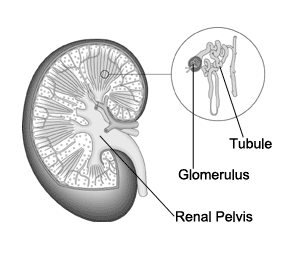|

What
are the kidneys ? | How do kidneys work ? |
Why
are kidneys so important ?
Who is at risk of developing kidney disease ? |
What are
the common warning signs of kidney disease ?
What happens if the kidneys fail ? | How can you help prevent
kidney disease ?

The kidneys are the master chemists of the body. Normally,
there are two of them, one on either side of the spine under the lower
ribs. They are reddish brown in colour and shaped like kidney beans. Each
kidney is about the size of your clenched fist. Many other organs depend
on the kidneys in order to work properly.

LOCATION OF KIDNEYS

The main job of the kidneys is to remove wastes from the
blood and return the cleaned blood back to the body. Every minute, about
one liter of blood (one fifth of all the blood pumped by the heart) enters
the kidneys through the renal arteries. After the blood is cleaned, it
flows back into the body through the renal veins.
AN
ENLARGED VIEW OF A NEPHRON
|

WHAT
KIDNEYS LOOK LIKE
|
Inside
each kidney there are more than one million tiny units called nephrons.
Each nephron is made up of a very small filter called a glomerulus, which
is attached to a tubule. Water and waste products are separated from the
blood by the filters and flow into the tubules. Much of this water is
reabsorbed by the tubules and the wastes are concentrated into urine.
The urine is collected from the tubules in a funnel-like renal pelvis and
then flows through a tube called the ureter into the bladder. The bladder
stores urine until you urinate. Urine passes out of the body through a
tube called the urethra. The kidney normally makes one to two liters of
urine every day depending on how much you drink.
The normal kidney has the ability to greatly increase its workload. If one
kidney is lost, the other kidney can enlarge and do the work of two.

Your
kidneys are important because they do three essential things.
1. Kidneys regulate water :
For your body to work properly, it must contain just the right amount of
water. One of the important jobs of the kidneys is to remove excess water
from the body or to retain water when the body needs more.
2. Kidneys remove wastes :
Many of the substances in the blood and body fluid must be kept at the
correct level for
the
body to function properly. For example, sodium and potassium are minerals
which come from food. These minerals are needed by the body for good
health, but they must be kept at specific levels. When the kidneys are
working properly, excess minerals, such as sodium and potassium, are
excreted from the body in the urine. The kidneys also help to regulate the
levels of other minerals, such as calcium and phosphate, which are
important for the formation of bone.
Wastes, such as urea and creatinine, must also be removed from the body.
Urea and other wastes are made when the body breaks down protein, such as
meat. Creatinine is a waste product of the muscles. As kidney function
decreases, the levels of urea and creatinine in the blood increase.
Many waste products are toxic (poisonous) if they are not removed from the
body fluids. For example, when certain drugs are taken, chemical wastes
are produced which must be removed from the body by the kidneys.
3. Kidneys produce hormones :
Normal kidneys also make important chemical messengers called hormones.
These hormones circulate in the bloodstream and regulate some body
functions such as blood pressure, the making of red blood cells, and the
uptake of calcium from the intestine.

Kidney disease usually progresses silently, often
destroying most of the kidney function before causing any symptoms.
Therefore, people at risk of developing kidney disease should be evaluated
regularly. These people include those with diabetes,
high blood pressure
or blood vessel diseases, and close relatives of people with hereditary
kidney disease.

Sometimes even people with serious kidney disease may not
have any symptoms. That is why a blood or urine test may be necessary to
check for kidney problems.
However, the signs and symptoms listed below may indicate kidney disease
and if they are present, a medical assessment to check out the kidneys
would be advisable.
Some of the Signs and Symptoms That May Indicate Kidney Disease
·
High blood pressure (hypertension)
·
Puffiness of the eyes, hands and feet
·
Passage of bloody, cloudy or tea-coloured urine
·
Presence of protein in the urine
·
Excessive foaming of the urine
·
Frequent passing of urine during the night
·
Passing less urine or difficulty passing urine
·
Fatigue
·
Loss of appetite or weight
·
Persistent generalized itching

When the kidneys fail, wastes and fluids accumulate in your
body and you need dialysis treatments (to clean your blood either by
machine or in your abdomen), or a kidney transplant.

Have your blood pressure checked regularly. Uncontrolled
high blood pressure can speed up the natural course of any underlying
kidney disease.
If you suffer from diabetes, make sure that your disease is under control.
A growing number of kidney patients are people with diabetes.
Be very careful about taking non-prescription medications, particularly
painkillers. It is wise to discuss all over-the-counter medications with a
doctor or pharmacist before they are taken.
Certain other medications, toxins, pesticides and illegal drugs (such as
heroin and cocaine) can also cause kidney damage. Your doctor can explain
the problems associated with long-term use or abuse of these substances.
Mail us for more information and
details

|